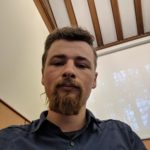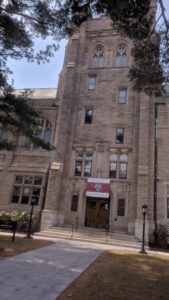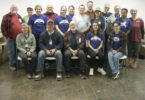By Obi Martin

Obi Martin, photo provided
This past weekend, I got to go to the International Conference on Christianity and Literature in Boston on a Pi Delta Research Grant from Bluffton University. The specific event title was “The Problem with God: Christianity and Literature in Tension.”
Lynn Martin, a fellow editor at The Curator let me know about the conference a few months ago, and since my soul consort Kenny Godoy attends Sattler College in Boston, I immediately began plotting how to attend.
Pi Delta grants exist to provide financial support for students at Bluffton doing work in their field of study beyond Bluffton’s academic requirements. The Bluffton handbook claims the grant is competitive, but based on the number of people who actually apply for it, I sort of doubt whether there is much competition involved.
In any case, I was awarded the full amount, and after arranging registration, housing, a ticket out of Detroit and other travel expenses, I had a comfortable margin left over for coffee and pastries. When I looked up the schedule of the sessions, lo and behold, there was my American Lit professor–Bluffton’s very own Dr. Lamar Nisly–reading a paper on “The Problem of God-talk: How Can Writers Write if Words are Exhausted?”

Harvard Divinity School photo by Obi Martin
Once I decided to go, of course, I bullied and cajoled Lynn, who had wanted to but was getting end-of-the-semester cold feet, to attend as well Thankfully he acquiesced, and drove the eight hours from Maryland through harrowing East Coast Megapolis traffic to get there.
I flew out of Detroit on Friday morning, and spent an hour-long flight talking to an ancient and feisty ex-Bostonian who “lived in Boston a hundred years ago,” and was going back to say a mass for her “99-year-old mother who died last week, unfortunately not making it to 100.”
Her memory may have no longer been strictly linear, but she did have vision for life.
“Education is just the start,” she said.
Of the many things that Boston is, intuitively laid-out it is not. Cambridge especially is a snarl of tangled streets, awkward alleys, bleak parks and thoroughfares that dive above and below the ground.
In between all this are slashed streets with varying lengths and rationales you might expect to find if you turned a toddler loose on a giant pizza with a rolling pizza-cutter. The uninitiated pedestrian like myself is left walking in many directions he has no need to.
I emerged from the metro line at Harvard Square and tried to rush off directly toward Harvard Divinity School where the conference was being held, but found the first several directions I tried insensitive to my intentions or compass. I wasn’t entirely up on the whole timing and schedule of the conference, but when I got to Andover Hall around 2 p.m. expecting things to be in full swing, I was actually an hour early and had time to go out and walk around again in various directions and get rained on before the first session. This was fortunate, as I didn’t have to miss Lamar Nisly like I thought I might since he presented in the first round of sessions.
Alongside papers read on John Donne’s poem “Resurrection Imperfect,” C. S. Lewis’s novel “Till We Have Faces” and Chaucer’s sermon “The Pardoner’s Tale,” Nisly presented from his work on Flannery O’Connor, Walker Percy, Leif Enger and Tim Gautreaux.
Friday evening, two Conference on Christianity and Literature awards were given. Book of the Year Award went to Irish poet Micheal O’Siadhail for his condensation of modern cultural history in “The Five Quintets,” and the Lifetime Achievement Award went to poet and essayist Kathleen Noris.
After the final session, Lynn and I broke ties with our Mennonite heritage and personal instincts and left without taking advantage of the dinner reception afterwards in order to meet up and eat with our friends not attending the conference. In my pragmatically well-formed conscience, leaving something behind already payed for feels so much like contract-breaking as to register a guilt level on par with dishonesty.
Saturday morning, I fortified myself with several blueberry bagels Kenny and I had gathered from a Panera dumpster on our wanderings across the city the night before, and headed off again to Andover Hall. The morning proved to be educational both literarily and culinarily, as I learned two interesting and useful details about Harvard breakfast. Number one, it can be served anytime before noon. Number two, avoid the muffins at all costs. After sitting through several delicious rounds of papers, around 11 a.m. someone announced that “breakfast” was being served in the Brown Room. The content, coffee, fruit and pastries I could have identified as breakfast, but the timing however was new to me.
I snagged two crunchy looking blueberry muffins and headed off to the next session on “Resisting Weak Faith” and “The Problem of the Post-secular.”
Unlike your ordinary muffin, these were concave instead of convex, dipping down into the paper rather than swelling out. Their depth looked promising. The crunchy part though, it turned out, was only a thin film along the top of sugar baked into the crust.
As nasally voiced Dr. Gonch whined on about pluralist susceptibility in “The Death of the Archbishop,” I forked my way deeper and deeper into the worst muffin of my life.
It was atrociously undercooked, mealy, and more alkaline than a battery core. So bad it was, that I kept wondering if this was a sort of pastry with which I was totally unfamiliar.
Was it a crab-cake? A lady-bug pie? Perhaps there is a particular Bostonian oatmeal blueberry muffin recipe that calls for four times as much baking soda as actual baking, you never know.
My optimism goes only though so far; I did not eat the second.
The conference overall, as I’ve said to everyone who has asked, did meet and exceed all expectations. In under 10 hours of lecture, I took over 20 handwritten pages of notes that I know I’ll have reason to return to often.
Walking away from the conference Saturday afternoon, I tried to identify what for me at least, had been the main or recurring themes of “Christianity and Literature in Tension.” I think I found three: the need for new/old forms of reading, the need for a vibrant Christian poetics in the 21st century and the need for finding meaning beyond theory and full-articulation.
Susan Felch presented a paper on “Post-Critique and the Process of the Text,” alluding to the primary 20th century mode of reading that went from asking questions of a text to hostile, power-based approaches where reading well came to mean doing nothing more than pointing out the problems in a text.
While Susan acknowledged the “odious odor of naive reading is difficult to dispel,” she pointed out that critique is ill-equipped to engage sacred texts, because sacred texts do not claim to be validated or invalidated by subjective critique, but instead by the fact that they make universal claims upon the reader.
Both religious fundamentalists and moral relativists have reduced texts of their potential by using them as methods of coercion rather than offering them acts of love. New modes of reading can learn from modes both ancient and medieval, and through contemplation and attention, more richness can be drawn from reading than from either aggressive or consumerist critique or “harvesting.”
One way of characterizing our century is post-Christian, in that neither the old, institutional forms of Christianity such as Roman-Catholicism nor any Christocentric commitments seem hold any influence in public life or societal consciousness.
Another way of characterizing our century though, is post-secular, in that the secular constructions of rationalism and naturalism from modernity are also losing influence and giving ground to a shifting interest in the extrasensory.
On the question of what Christian literature has to offer in the 21st century, Jack Dudley said it’s clear that criticism has been secular, but it is less clear that literature ever was. He pointed out that the literature has always been concerned with the problem of God, and that traditions which have sustained this tension will have much to offer in the post-secular arena.
David Mahan said that he’s no longer interested in the arguments for or against being a Christian. He just is one, and for him that means responding as responsibly and convincingly as possible to our common human concerns and difficulties through literature. He said we are in the world to make it richer, and that everything we do–including literary scholarism–should do so.
Perhaps the richest session, delivering far more than I could take in, was “Problems with God in Medieval Literatures”, in which poems and sermons from medieval mystics were discussed. In these sermons and poems, there was a beautiful recognition of meaning beyond the closure of syllogism or full-articulation.
There is a depth to truth that the intellect cannot exhaust or monopolize.
In a different session, Brent Little said, “In the experience of enjoying a great myth, we come the closest that we can to appreciating truths that we cannot express.” Alongside fictions, parables, and myths, rituals and practices can also be languages informing us of who we are, perhaps through deeper veins than linguistic communication.
Faith in the transcendent means recognition of a reality that we can never finally express. The expressions of it that we are given include and go beyond language to include the seeking of silence, the contemplation of prayer, and the participation of shared ritual, attention and experience.






